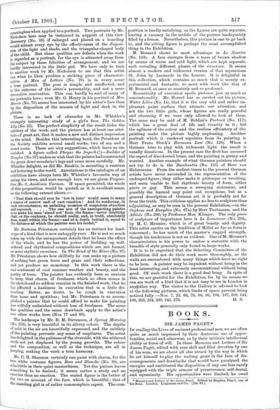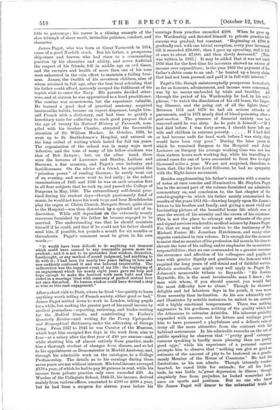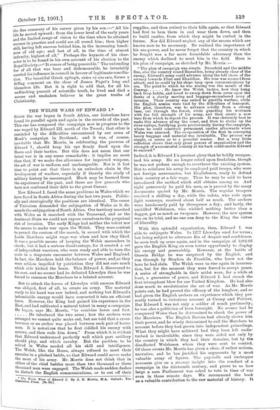BOOKS.
SIR JAMES PAGET.* IN reading the Lives of eminent professional men we are often quite as much impressed by their dexterous use of oppor- tunities, social and otherwise, as by their intrinsic intellectual ability or force of will. In these Memoirs and Letters of Sir James Paget, edited with rare skill and filial devotion by one of his sons, we are above all else struck by the way in which he set himself to play the waiting game in the face of die- couragements and drawbacks that would have paralysed the energies and embittered the disposition of any one leas rarely equipped with the triple armour of perseverance, self-denial, and equanimity. His opportunities were limited, he owed
• Memoirs and Letters of Sir Jams. Paget. Edited by Stephen Paget, one of his Sons. London ; Longman and Co. [12s. 6d.-I
ittle to patronage; his career is a shining example of the slow triumph of sheer merit, invincible patience, conduct, and character.
James Paget, who was born at Great Yarmouth in 1814, came of a good Norfolk stock. But his father, a prosperous shipowner and brewer, who had risen to a commanding position by his character and ability, and never forfeited the respect of his friends, fell in middle age on evil times, and the energies and health of more than one of his sons were exhausted in the vain effort to maintain a failing busi- ness. James, the twelfth of his seventeen children, nine of whom attained to full age, after the best local schooling that his father could afford, narrowly escaped the fulfilment of his boyish wish to enter the Navy. His parents decided other- wise, and at sixteen he was apprenticed to a local practitioner. The routine was monotonous, but the experience valuable.
He learned a good deal of practical anatomy, acquired businesslike habits, became an expert dispenser, taught him-
self French with a dictionary, and had time to gratify a hereditary taste for collecting to such good purpose that at the age of twenty his Natural History of Yarmouth, com-
piled with his brother Charles, attracted the favourable attention of Sir William Hooker. In October, 1834, he went up to St. Bartholomew's Hospital, and entered on the long ordeal of waiting which lasted for full ten years.
The organisation of the school was in many ways most defective, and the tone of many of his fellow-students was that of Bob Sawyer ; but, on the other hand, there were the lectures of Lawrence and Stanley, Latham and Burrows, a fine museum, and Paget's own industry and fastidiousness. On the advice of a friend, he acquired the " priceless power " of reading German : he rarely went out of an evening, and never went to bed early; in the school examinations of 1835 and 1836 he was on each occasion first in all four subjects that he took up, and passed the College of Surgeons in May, 1836. The extraordinary self-denial prac- tised during his student days—though passionately fond of music, be would not leave his work to go and hear Mendelssohn play the organ at Christ Church, Newgate Street, quite close to the Hospital—was then disturbed by a splendid act of in- discretion. While still dependent on the extremely scanty resources furnished by his father he became engaged to be married. The understanding was that he should maintain himself if he could, and that if he could not his father should send him, if possible, ten pounds a month for six months or thereabouts. Paget's comment must be given in his own words :— "It would have been difficult to do anything not immoral which could have seemed to any reasonable person more im- prudent; and it is not to be pretended that wisdom, discretion, forethought, or any method of sound judgment, had anything to do with it; I had been for nearly two years falling in love and now suddenly confessed it and was believed trustworthy. The indiscretion was the happiest event of my life : the beginning of an engagement which for nearly eight years gave me help and hope enough to make the heaviest work seem light and then ended in a marriage blest with constancy of perfect mutual love not once disturbed. No human wisdom could have devised a step so wise as this rash engagement."
After a short visit to Paris, where he lived "too quietly to learn anything worth telling of French society, either good or bad," James Paget settled down to work in London, taking pupils for a while, but making the greater part of his small income by medical journalism—reporting, reviewing, and leader-writing for the Medical Gazette, and contributing to Forbes's Quarterly Review—and writing for the Penny Cyclopmdia and Biographical Dictionary under the editorship of George Long. From 1837 to 1843 he was Curator of the Museum, which kept him occupied five days in the week from nine to four—at a salary after the first year of £40 per annum—and, while shutting him off almost entirely from practice, made him a thorough student of changes from disease, and so led to his appointment as Demonstrator in Morbid Anatomy, and through his admirable work on the catalogue, to a College Professorship. The details as to his earnings during these seven years are not without interest. His total income averaged £170 a year, of which he had to pay 50 guineas in rent, while his income from private practice only once exceeded £20. As Warden of the Collegiate School, 1844-51, his income, derived mainly from various offices, amounted to £500 or £600 a year, but he had been a surgeon for sixteen years before his
earnings from practice exceeded £100. When he gave up the Wardenship and devoted himself to private practice his success was gradual, but constant. "Beginning at £700, it gradually and, with one trivial exception, every year increased till it exceeded £10,000; then I gave up operating, and it fell at once to about £7,000, and then slowly decreased," [Thi, was written in 1885.] It may be added that it was not until 1856 that for the first time his accounts showed an excess of income over expenditure; in the year 1862 the payment of his father's debts came to an end : " he hunted up a heavy claim that had not been pressed, and paid it in full with interest."
Paget's life, though uninterruptedly prosperous henceforth so far as honours, advancement, and income were concerned. was by no means unclouded by trials and troubles. All through the period of his Wardenship he had, in his son's phrase, " to watch the dissolution of his old home, the linger. ing illnesses, and the going out of all the lights there." Between 1851 and 1870 he had six serious attacks of pneumonia, and in 1871 nearly died of blood-poisoning after a post-mortem. The pressure of financial anxiety was not removed until he was sixty. As he puts it himself :—" If I had died before I was forty-seven, I should have left my wife and children in extreme poverty. . . . . . If I had died or had become unfit for hard work before I was sixty, they would have been very poor." During the later years in which he remained Surgeon to the Hospital and Joint Lecturer on Surgery his average working time was not less than sixteen hours each working day, while his travelling to attend cases far out of town amounted to from five to eight thousand miles a year. We are not surprised, therefore, to learn that, like the late Lord Selborne, he had no sympathy with the Eight-hours movement.
Besides supplementing his father's memoirs with a number of notes at once concise and illuminative, Mr. Stephen Paget has in the second part of the volume furnished an admirable commentary on, and conclusion to, the last chapter of the autobiography—in which his father merely summarised the results of the years 1851-85—drawing largely upon Sir James's letters to his brother and family, and giving a most vivid and fascinating picture of the beautiful home life which was at once the secret of his serenity and the crown of his existence. This is not the place to attempt any estimate of the great and signal services rendered to medical science by James Paget. For that we may refer our readers to the testimony of Sir Michael Foster, Mr. Jonathan Hutchinson, and many other experts contained in this volume. It is enough for the moment to insist that no member of his profession did more in his time to elevate the tone of his calling and to emphasise its momentous responsibilities ; that no one commanded in a greater measure the reverence and affection of his colleagues and pupils, or bore with greater dignity and gentleness the honours which requited the long years of self-denial and of faithful service. Mutatis mutandis, one might very well apply to Paget Dr. Johnson's memorable tribute to Reynolds : " Sir Joshua Reynolds, Sir, is the most invulnerable man I know; the man with whom, if you should quarrel, you would find the most difficulty how to abuse." Though he shunned delights and led laborious days in his youth, it was more from necessity than inclination. As his son admirably says and illustrates by notable instances, he united, to an austere will a highly emotional temperament. There was nothing aggressive in his goodness, nothing of the quality which led the Athenians to ostracise Aristides. His inherent geniality expanded with success, and his letters and writings prove him to have possessed a playfulness and a delicate vein of irony all the more attractive from the contrast with his habitual seriousness. In his admirable remarks on the art of public speaking he observes that " ' pretty good' extempo- raneous speaking is hardly more pleasing than are pretty good eggs," while his experience of a personal canvass prompts him to observe that " nothing can give so good an estimate of the amount of pity to be bestowed on a gentle- manly Member of the House of Commons." He had his limitations, as his son admits. Though intensely tender- hearted, he cared little for animals ; for all his forti- tude, he was liable to:great depression in illness ; though singularly free from prejudice, he looked somewhat ask- ance on sports and pastimes. But no one who knew Sir James Paget will demur to the substantial truth of the fine summary of his career given by his son :—" All his life he moved upward : from the lower level of the early years and the limited range of vision to the time when he attained success in practice and could see all round him ; then higher still, having left success behind him, in the increasing loneli- ness of old age; and last of all, in the time of utmost infirmity, highest of all." Perhaps the keynote of his char- acter is to be found in his own account of his election to the Royal Society,—" It comes of being peaceable." The unbending foe of all that was base and dishonourable, he invariably exerted his influence in council in favour of legitimate concilia- tion. The beautiful Greek epitaph, drips Ti; sipi7liGtri1, forms a fitting comment on the close of James Paget's long and blameless life. But it is right to add that, for all his unflinching pursuit of scientific truth, he lived and died a serene and unshaken believer in the great truths of Christianity.
















































 Previous page
Previous page